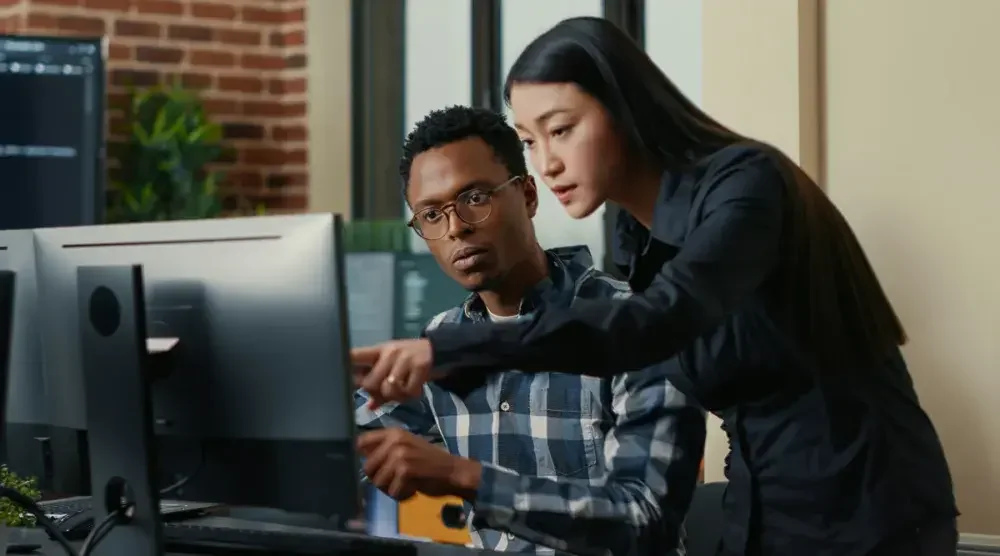Whether you’re an individual creator or a business owner, a copyright lawyer can help you license your work, address copyright infringements, and help ensure your creations receive proper legal protection. To help you decide if you should work with one, we’ll explain the role of copyright lawyers and what you can expect from their services.

What does a copyright attorney do?
Copyright attorneys help clients protect their intellectual property across various fields, including literature, music, art, software, and inventions. Also known as intellectual property lawyers, they primarily help their copyright clients in two ways: assisting with copyright applications and handling infringement issues. Here’s an overview of their services:
- Copyright compliance. Help clients understand how to use copyrighted material legally, including fair use guidelines and obtaining licenses.
- Document preparation and review. Draft and review essential documents, including copyright applications for the U.S. Copyright Office, cease and desist letters, and collaboration agreements.
- Copyright searches. Research existing copyrights to avoid potential infringement issues before publishing or using creative works.
- Copyright portfolio management. Manage and maintain multiple copyrights for businesses or creators with several works.
- Legal representation in disputes. In case of copyright infringement, these attorneys negotiate settlements or represent clients in court.
While some creators can handle basic copyright matters themselves, copyright attorneys offer significant advantages. Most importantly, they remove uncertainty from the process and allow you to focus on your creative work rather than the legal intricacies.
5 reasons you need a copyright lawyer
If you’re uncertain about copyright protection or enforcement, you might consult a specialized lawyer for the following reasons:
1. Copyright expertise and legal advice
Copyright law is a specialized field that covers various types of original and artistic works, from writing to architectural designs. However, the field is continually shaped by legislative updates, court decisions, and technological advancements, making it challenging for creators to stay informed of their IP rights and obligations.
As a result, you want a lawyer who can help you understand and work through various legal issues, such as:
- The scope and limitations of copyright protection
- The relationship between copyright and other forms of intellectual property (such as trademarks and patents)
- Digital Millennium Copyright Act (DMCA) compliance
- International copyright treaties and their implications for global protection
A copyright attorney provides tailored advice on how these aspects of copyright law apply to your situation, helping you make informed decisions to protect your intellectual property.
2. Filing a copyright
While it’s possible to file a copyright application independently, a copyright attorney is better equipped to ensure your application is complete and accurate. They’ll help you determine the most appropriate type of copyright registration for your work, considering the nature of your creation (e.g., literary works vs. software), its intended use, and potential future adaptations.
Your attorney will then prepare all necessary documentation, including detailed descriptions of your work and any required deposits or samples. They also help ensure all information is correctly formatted to meet the U.S. Copyright Office’s requirements. Likewise, if any issues arise during the registration process, such as requests for additional information, your attorney will be there to handle them.
3. Handling licensing and fair use issues
Licensing your copyrighted work can be lucrative, but it’s not without potential legal complications. A lawyer can help you draft and review licensing agreements, including negotiating terms like royalty rates, usage rights, and duration. Throughout the process, they explain the agreement’s implications and ensure it aligns with your long-term goals for your work.
On the other hand, if you want to use someone else’s copyrighted material, a lawyer can help you work through the licensing process or determine if your application falls under fair use guidelines. If it doesn’t qualify as fair use, however, your attorney may be able to help you obtain the necessary licenses or permissions.
4. Defending against infringement
If someone uses your copyrighted work without permission, you should contact a copyright lawyer immediately to protect your rights. In most cases, they will first try to send a cease and desist letter, demanding that the infringing party stop using your work. If necessary, they can escalate the matter by filing a lawsuit.
In these cases, they’ll gather evidence and represent your interests in negotiations or court proceedings. Conversely, they can also help you respond if you’re accused of infringement and take action to remedy the situation.
5. Managing and protecting your copyright portfolio
As your career progresses or your business grows, you want a lawyer who can establish systems for tracking and enforcing your copyrights. This includes maintaining records of registration dates, renewal deadlines, and licensing agreements. Having this organized from the start will save you stress (and likely money) down the road, especially if your creative output increases significantly.
A copyright lawyer can also help you prepare for various growth scenarios. For instance, they might develop policies for how your copyrighted material can be used if you expand into new markets or collaborate with other creators. Alternatively, they can advise on protecting your work in digital formats as new technologies emerge, such as NFTs or AI-generated content.
How much does a copyright lawyer cost?
Generally, copyright lawyers use one of three billing methods: hourly rates, contingency fees, or fixed prices for specific services.
Hourly rates are common for ongoing legal work and can range from $100 to $500 per hour. Contingency fees, where the lawyer takes a percentage of any damages awarded, are less common in copyright cases but might be used in infringement suits. Some attorneys offer fixed prices for routine services like drafting agreements or copyright registration, which might cost between $300 and $1,000, if not more.
Several factors influence the total cost of hiring a copyright lawyer, including the following:
- Case complexity. More intricate issues, such as disputes over ownership or new and emerging technologies, typically require more time and expertise.
- Lawyer’s reputation and experience. Experienced attorneys with strong track records in copyright law often charge higher rates.
- Geographic locations. Regardless of the specialty, lawyers in major metropolitan areas like New York or Los Angeles generally charge more than those in smaller cities.
- Size of the law firm. Large firms often have higher overhead costs, which can translate to higher fees compared to smaller firms or solo practitioners.
It’s important to discuss fees upfront with any lawyer you’re considering hiring. Many copyright attorneys offer free initial consultations, which can be an opportunity to get a fee estimate before committing.
What to expect from hiring a copyright attorney
During an initial consultation with a copyright attorney, you’ll discuss your situation, goals, and potential strategies. Your lawyer will then gather detailed information about your work and propose a plan of action, after which you decide whether or not to move forward with their services.
They’ll handle most of the legal paperwork and procedures, but you will need to review and sign documents as needed. If your case involves disputes, your lawyer will represent you in negotiations or court proceedings. However, the timeline can vary significantly, as simple copyright registrations might take a few months, whereas contested infringement claims can last years.
Regardless of why you decide to work with one, remember to be honest, ask questions if you don’t understand something, and keep detailed records of all relevant documents and interactions related to your work. With the right attorney, you can help make sure your work receives the protection it deserves and focus on what you do best—creating.
FAQs
Do you need a lawyer to copyright something?
While you can register a copyright on your own, a lawyer can be particularly valuable for complex works or if you’re unfamiliar with the process. A lawyer advises on your options and rights, handles the application process, and helps avoid pitfalls that could jeopardize your copyright protection. We can help you find an attorney who will handle the copyright process.
What should I look for when choosing a copyright lawyer?
Look for a lawyer with specific experience in copyright law, particularly in your creative or technological field. Consider the full spectrum of their background, such as their track record, communication style, and fee structure. They should be able to explain complex legal concepts clearly and show a genuine interest in protecting your work.
What is fair use, and how can a copyright lawyer help with it?
Fair use allows limited use of copyrighted material without permission for purposes like criticism, commentary, or education. A copyright lawyer can assess whether your or someone else’s use of copyrighted material qualifies as fair use, considering factors like purpose, amount used, and market impact.


